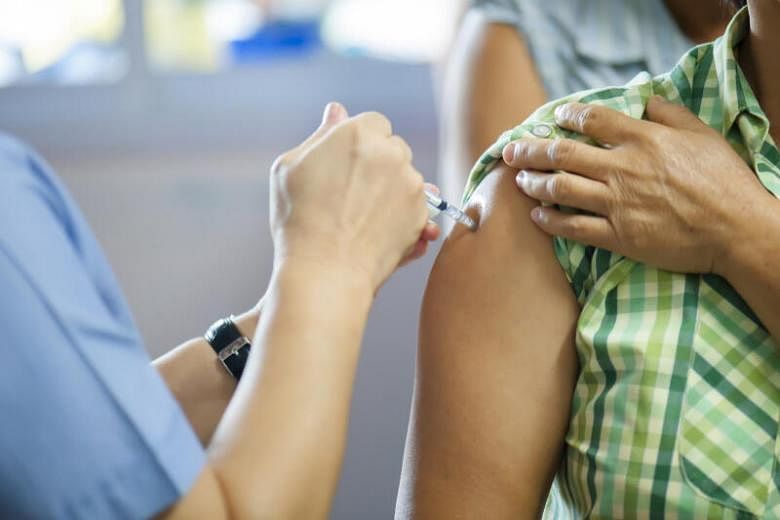SINGAPORE - Digital marketer Lyn Yan took a flu shot in June amid the pandemic when she realised there were similar symptoms for the coronavirus and influenza.
The 31-year-old said: "It may be difficult to tell the difference between the two based on symptoms. I wanted to take care of myself better during this period and as the flu vaccine is available, I felt I should take it."
Adopting such proactive measures to stay healthy can help people take better charge of their health while the search for a Covid-19 vaccine continues.
This means getting vaccinated against preventable diseases, such as influenza and pneumonia, said doctors.
Besides the mandatory childhood vaccines for measles and diphtheria, which have a high take-up rate of over 95 per cent for the past 10 years in Singapore, the rates for other vaccines do not have the same success, said Dr Leong Choon Kit, a family physician at Mission Medical Clinic in Serangoon.
"In general, most non-mandated vaccines see only a 10 to 15 per cent take-up rate. This is far from ideal," he said.
The vaccination coverage for some of the recommended adult vaccines has been estimated to be low - 14 per cent for influenza vaccination and 12 per cent for pneumococcal vaccination for those aged between 65 and 74 years old, according to the pilot National Population Survey 2016-2017.
The Ministry of Health introduced the National Adult Immunisation Schedule (Nais) in 2017 to encourage adults to take up important vaccinations. It provides immunisation recommendations to help people make an informed decision.
There are seven listed vaccines for infections such as influenza, pneumococcal and the human papillomavirus (HPV) in the schedule.
From Nov 1, eligible Singaporean children under the age of 18 will receive free vaccinations for diseases like influenza and chickenpox as part of enhanced subsidies for nationally recommended vaccines.
Singaporean adults can benefit from higher subsidies of between $35 and $125 for nationally recommended vaccines on the list.
These vaccines are under the National Childhood Immunisation Schedule (NCIS) and Nais, which are administered at all Community Health Assist Scheme (Chas) general practitioner (GP) clinics and polyclinics.
Dr Leong Hoe Nam, an infectious diseases expert with Rophi Clinic at Mount Elizabeth Novena Hospital, said there may be a few reasons for the poor uptake of immunisations.
"Many Singaporeans have a superman or superwoman mentality. They think it (the disease) won't happen to them. I had one patient who was scheduled to come for shingles vaccination in March, but she didn't. She came back in April to see me for severe pain from shingles, when it could have been prevented."
The fear of needles as well as worries about the side effects and effectiveness of vaccines tend to put people off, he said.
There are also people who refuse to be immunised against diseases, commonly known as anti-vaxxers.
Among reasons such as a lack of confidence in vaccines, they also do not trust pharmaceutical companies, which they believe to be motivated by profit.
However, there are many benefits to taking up vaccinations.
A person is less likely to get the particular disease after being vaccinated, said Dr Leong Hoe Nam, although not all vaccines work 100 per cent. "There are some failures. Different people respond differently to the same antibiotics."
Achieving herd immunity is another reason doctors encourage vaccination.
This form of immunity occurs when vaccination of a significant proportion of the population provides protection for those who have not developed immunity.
Dr Leong Choon Kit said: "We do that for diseases like influenza, chickenpox and dengue. This is to reduce the number of viable hosts a virus can find in a community so that an epidemic can be prevented and the vulnerable can be protected. The upcoming Covid-19 vaccine will likely serve that function too."
Some vaccine-preventable diseases can cause cancer. For example, HPV and Hepatitis B viruses can be transmitted between adults who are not vaccinated and are the most common causes of cervical and liver cancer in the world.
"So, in a way, getting vaccinated prevents cancer. The Hepatitis B vaccine prevents liver cancer and the HPV vaccine prevents cervical cancer," said Dr Leong Choon Kit.
Vaccine-preventable diseases can put pressure on healthcare systems.
He adds: "We are seeing this during the current pandemic, in which Singapore is experiencing a Covid-19 outbreak and a severe dengue outbreak at the same time. All our healthcare facilities including primary care and hospitals could be swamped with suspected dengue cases and patients with acute respiratory infections."
He noted that confusion may arise in the diagnosis and management of the diseases in such times.
"For instance, both dengue and Covid-19 present with fever at the beginning of the infection. So all patients will need to be swabbed and additional tests have to be conducted for both groups of patients.
"During the severe acute respiratory syndrome (Sars) outbreak in 2003, there was confusion between Sars and influenza. If the public is well vaccinated against influenza, the noise to diagnosis will be less."
Dr Leong Choon Kit highlighted the increased importance of taking an influenza shot during this pandemic. "The risk of an influenza outbreak is always present. The vulnerable may not be able to survive two simultaneous infections. Hence, immunising against influenza is more important now than before Covid-19 started," he said.
The motivation to be vaccinated comes from the individual, he added. "Frequently, when they have suffered or when they have seen their loved ones suffer, they would be more convinced to be vaccinated."
Agreeing with this, Dr Leong Hoe Nam said: "The disease needs to strike home. For example, when people see a friend or relative get severe influenza, they will vaccinate against it. Otherwise, hearing stories of others whom they don't know doesn't put them on alert."
Both doctors remind patients of the importance of vaccinations during consultations.
While Dr Leong Hoe Nam understands that people may fear getting Covid-19 if they visit a clinic for a vaccination during this time, he said it is an "unfounded worry".
"Going to the clinic for a vaccination is the same as going out for a meal. The mask remains on during the vaccination. This reduces transmission risk significantly."
The doctors advised people to check on the availability of the vaccines and make an appointment for vaccination instead of just heading to the GP clinic.
Dr Leong Hoe Nam suggested using birthdays or significant occasions as reminders to stick to a schedule of getting vaccinated.
As it is important for the public to be educated on immunisations, Dr Leong Choon Kit encouraged people to get accurate information from reliable sources such as health authority websites instead of social media.
Getting vaccinated goes beyond prevention and protection of the individual.
Dr Leong Hoe Nam said: "If we all work together and achieve herd immunity, we can successfully push back the infection. The population will benefit. And from the public health perspective, this lowers disease occurrence and burden."
SIX MYTHS ABOUT VACCINES
The anti-vaxx movement, which spreads fear and misinformation about vaccines, has been growing for decades and has become a major worldwide threat, especially in the West.
Last year, the World Health Organisation declared "vaccine hesitancy" - the reluctance or refusal to vaccinate despite the availability of vaccines - as one of the top 10 threats to global health.
The measles outbreaks in Europe and the United States have been attributed to fewer people getting vaccinated. Last year, the US reported 1,282 cases of measles in 31 states - the largest number of cases in the country since 1992.
Vaccines have been developed to protect people against diseases that can cause serious illness. They stimulate the body's own immune system to protect a person against an infection or disease.
While improvements in sanitation and hygiene have played an important part in controlling the spread of infectious diseases, vaccination has been critical for the control of these diseases.
Without vaccination, individuals remain susceptible to the infectious agents causing these diseases.
Dr Leong Choon Kit, family physician at Mission Medical Clinic, dispels six myths about vaccinations.
1. A VACCINE IS AN ARTIFICIAL INFECTION
A vaccine is technically not an infection. Vaccines are made of part of a virus or pathogen, or an inactivated virus or pathogen.
They do not have the ability to cause disease.
2. A VACCINE MAKES ONE SICK
In general, vaccines will stimulate an immune response. These responses can at times lead to one feeling off colour for a brief period.
For instance, common side effects from an influenza vaccine include lethargy and bodyache. Most people recover quickly without any treatment.
3. IT IS BETTER TO CATCH THE NATURAL DISEASE THAN BE VACCINATED
In general, the infections prevented by vaccines can be either fatal or debilitating.
So, one may succumb to the disease even before any chance of developing any immunity.
Often, an infection also leaves a trail of damages in the body's organs, which cannot be reversed. Prevention is always better than cure.
4. DON'T DO HOUSEWORK, EXERCISE OR TAKE A SHOWER AFTER GETTING A VACCINATION
Vaccination does not impair one's performance when exercising or doing housework. Anyone can exercise right after receiving a vaccination.
Similarly, showering does not affect the effects of any vaccine, so there is no reason not to have a shower.
5. THE MEASLES VACCINE CAUSES AUTISM
It has been proven by many studies that the measles vaccine does not cause autism.
Autism is a condition that is brought about by a neurological dysfunction.
6. AN INFLUENZA VACCINE IS MEANT FOR TRAVEL
The influenza vaccine is to protect against influenza infection. It is commonly done before travel.
However, influenza is common and can occur any time of the year.
The influenza virus can spread rapidly to a person even if he or she does not travel.


